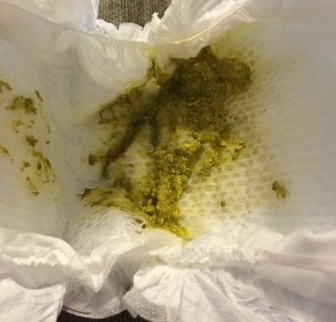Any change in the color or consistency of baby poop can make new parents nervous and concerned about their baby's health. They sometimes think their baby is pooping too often. The truth is that baby poop can have many shades and consistencies, and it is possible to notice green poop in breastfed baby, which is obvious to surprise new parents. Is it anything serious? Should you take your baby to your doctor for a checkup? Come find out more about it.
Green Poop: Why Does It Happen?
There is no need to worry about green poop in breastfed baby so long as he/she is eating well, gaining weight in a healthy way, and has no blood in stool. However, it is also important to know that poop changes usually happen for a reason.

1. Foremilk Hindmilk Imbalance
Your baby only gets foremilk when you first start nursing. After they empty it from your breast, they get the richer, fattier hindmilk. Switching breasts too often or having an oversupply of foremilk may lead to an imbalance of foremilk and hindmilk. You still do not need to worry unless your baby spits up a lot, constantly wants to nurse, experiences gassiness, or has a diaper rash. Consider limit feeding to one breast only to correct the imbalance.
2. Your Diet
What you eat may be the reason of green poop in breastfed baby. Eating too much of greens and having too much of green drinks and foods, including green sodas, green gelatin, and green sports drinks can change the color of your milk and in turn affect you baby's poop color.
3. A Tummy Bug
A change in poop color may happen when your baby is ill. The color may not return to normal for weeks. Just do not stop breastfeeding because that improves immunity and gives your baby ability to fight illness.
4. Drug or Food Sensitivity
The types of medications you take will have an impact on the color of your milk. Taking excessive iron supplements or antibiotics may play a role in changing your baby's poop green. These medications may also lead to the development of eczema or a rash in your baby.
Mostly, green poop in breastfed baby does not raise any alarms and is rarely a sign of a problem. If your baby is healthy and gaining weight well, do not worry about anything. However,it is still a good idea to talk to your doctor about it to help separate truth from common myths.
Normal Color and Consistency of Baby Poop
- Your baby's first stool will be black and tarry, which is the meconium present in her/his gut at birth.
- The stools are more likely to change into "transitional stools" by about the third day of birth – it also depends on how well breastfeeding is going.
- Your baby's poop will have a dark greenish color, which usually changes into yellow again by the fifth day.
- Its consistency will usually remain the same – liquid with seedy bits – until you give your baby anything other than the breast milk. Do not worry if your baby's poop is liquid without any seeds. That is quite normal too.
The yellow color comes from the fat in the breast milk. Provided that your baby is gaining weight well, they are going to poop at 3-4 times a day during the first six weeks or so. The stools in this case will have the diameter of a US quarter (22mm). You do not need to worry if you think your baby is pooping a lot, as it happens only when your baby is getting lots of milk. You may need to schedule an appointment with your doctor if your baby does not poop that often.
When to Worry About Baby Bowel Movement
It is important to take your baby for a weight check if he/she is not yet six weeks old, or does not poop at least 3-4 times a day. Your doctor will check his/her weight if the stool color does not changes to yellow by the fifth day to identify any cause for concern. Some healthy breastfed babies may begin to poop much less often after they are 6 weeks old – it could be once a week only. Do not use a bathroom scale to weigh them – take them to a health-provider's office for checkup. If they are gaining at least 30g of weight every day, you do not need to worry about anything. Everything is fine if your baby is gaining weight well.
Instead of worrying about green poop in breastfed baby, there are other situations when it makes sense to talk to your doctor about the health of your baby. For instance:
- There may be no bile from the liver to help with food digestion if you notice your baby's stool is chalky white.
- There may be blood in the digestive tract if the stool of your baby has a tarry black color.
- There is blood expressed closed to the anus if you notice bright red blood in the stools. It may also happen due to beets, medicines, and food colorings.
